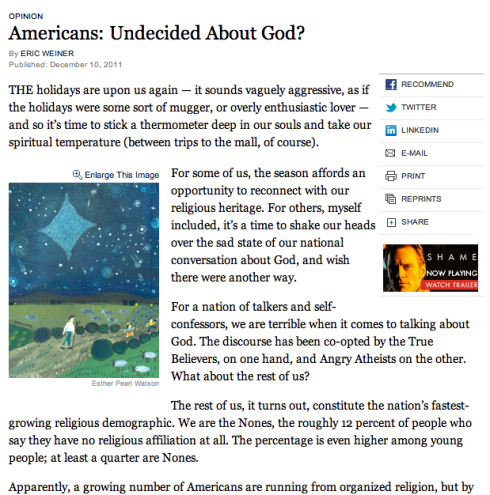NOTE: I found this draft of a blog post saved on my iPad’s WordPress app. It’s like over a year old! Maybe I didn’t hit “publish” because it sounds a little snarkier than I like to be. But I seemed to have put a lot of energy into it, and it would be a shame to waste it. So for what it’s worth, here’s a post on why UU congregations aren’t appealing to the “nones” the way we think they should be.
Last Sunday the New York Times published an opinion piece by Eric Weiner  entitled, “Americans: Undecided About God.” And judging by the response from some of my Unitarian Universalist friends and colleagues, you would have thought the article was called, “Americans: Ready to Become UUs.” I found this a little bit odd, since my title for the article would have been, “UUs: They’re Just as Screwed as Every Other Denomination in the United States.”
entitled, “Americans: Undecided About God.” And judging by the response from some of my Unitarian Universalist friends and colleagues, you would have thought the article was called, “Americans: Ready to Become UUs.” I found this a little bit odd, since my title for the article would have been, “UUs: They’re Just as Screwed as Every Other Denomination in the United States.”
The folks who thought the article was good news generally followed this line of reasoning:
- The fastest growing category of religious affiliation in the U.S. is “None”
- Unitarian Universalism is a non-creedal faith
- Nones should be attracted to a non-creedal faith
- Therefore, Nones should be attracted to Unitarian Universalism

Now if this were true, our congregations should be bursting at the seams. And I’m not talking the measly one precent annual growth we were used to until we started to decline a few years back. I’m talking Jefferson’s “there is not a young man now living in the US who will not die an Unitarian” kind of growth.
But that’s not happening, is it? The reason is these Nones are, to quote Weiner, “running from organized religion.” And the Unitarian Universalist Association of Congregations is, for all intents and purposes, an organized religion. Lest there be any doubt about the truth of that statement, let me repeat it, this time in all caps:
THE UNITARIAN UNIVERSALIST ASSOCIATION IS, FOR ALL INTENTS AND PURPOSES, AN ORGANIZED RELIGION.
(And just because there’s a joke that goes, “I’m not part of an organized religion, I’m a Unitarian,” doesn’t mean it’s true.) There is absolutely no reason why one of the 25% of the young adults in the United States who identifies as a None should walk through the doors of one of our congregations. Why? Because they’re just not looking for congregation doors to walk through.
So sharing Weiner’s article on Facebook with a comment like “Good news for UUs!” or “Hey, Nones! Have I got a church for you!” misses the point. This isn’t to say that there aren’t any young adult Nones coming to our congregations. But just because there’s a new type of religious person out that doesn’t mean they’re automatically going to be attracted to us. (And even if some of them did find their way to one of our congregations, there’s no guarantee that they’ll find the kind free thinking environment that would keep them coming since 97% of these Nones believe in God, and talking about God isn’t something that comes naturally in a lot of our congregations. By the way, if you want to know what I mean when I say “talking about God,” check out “Theology and the Church After Google.”)
So here’s the metaphor I’ve been working with lately. The content of our religion should, indeed, be attractive to Nones. The problem is how it’s being delivered. A bricks-and-mortar congregation is about as attractive to a None as desktop computer. While the content of either may be worth exploring (“Hey, this church has some pretty cool things to do! Hey, this desktop computer has every episode of Dr. Who on it’s hard drive!”), the odds that a None in search of an alternative to “organized religion” is going to wander into a UU congregation—or any congregation for that matter—is about as likely as a Millennial booting up a desktop computer to check what’s up on Twitter. In either case, said young adult None is more likely whip out a smart phone, or an iPad, or even a laptop, if they’re trying to be ironic.
So trying to increase the capacity of a congregation to serve people in a physical space, be it through expanding the building or hiring more support staff, is kind of like getting a new mouse or adding more memory to a laptop computer. They’re nice upgrades for the people who are already using it, and they might benefit some other folks in the general vicinity. But for people who have moved beyond things like organized religion and desktop computers, those upgrades probably seem pretty superfluous. Rather than seeing congregations as desktop computers confined to a one particular desk, we should start seeing congregations as servers, filling the web with our liberal religious and spiritual progressive content, ready to be accessed by any device, any time, anywhere.













Leave a comment
Comments feed for this article